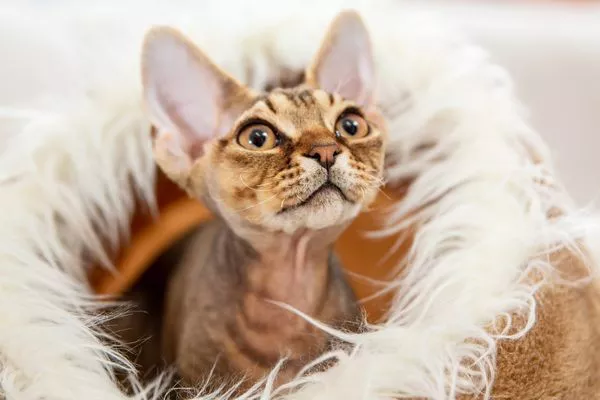Devon Rex cats are adored for their distinct appearance, characterized by large ears, short curly fur, and an engaging personality. While these cats are known for their lively and affectionate nature, like all breeds, they are susceptible to certain health issues. In this comprehensive guide, we will explore the unique health concerns that Devon Rex cats may face throughout their lives.
The Devon Rex Breed: A Brief Overview
Before diving into their potential health issues, let’s first understand what makes Devon Rex cats unique:
Physical Characteristics:
Coat: Devon Rex cats have short, curly, and often soft fur that feels like suede or velvet.
Ears: They are known for their large, bat-like ears that sit low on their heads.
Body: These cats have slender bodies with long legs and distinctive, oval-shaped eyes.
Personality: Devon Rex cats are playful, affectionate, and highly social. They thrive on human interaction and are often referred to as “people cats.”
Common Health Concerns in Devon Rex Cats
While Devon Rex cats are generally healthy, some breed-specific and common feline health issues may affect them. It’s crucial for Devon Rex cat owners and prospective adopters to be aware of these potential concerns:
1. Skin and Coat Issues:
Devon Rex cats’ unique coat can make them prone to skin problems. Common issues include:
Mites: They may develop demodex or ear mites, which can cause itching and discomfort.
Seborrhea: This skin condition can lead to dryness, flakiness, or excessive oiliness of the skin.
Allergies: Some Devon Rex cats are sensitive to allergens and may experience skin reactions.
2. Respiratory Conditions:
Devon Rex cats have relatively large nostrils and sinus passages, making them prone to respiratory infections. These infections can lead to sneezing, nasal discharge, and occasionally, breathing difficulties.
3. Gastrointestinal Issues:
Like many other cat breeds, Devon Rex cats may experience digestive problems, including:
Irritable Bowel Syndrome (IBS): Symptoms may include diarrhea, constipation, or chronic vomiting.
Food Sensitivities: Some Devon Rex cats have sensitivities to specific ingredients, requiring a careful diet.
4. Dental Health:
Oral hygiene is essential for all cats, including Devon Rex. Their unique genetic makeup may make them prone to dental issues like gingivitis and periodontal disease. Regular dental care, including brushing their teeth or providing dental treats, is crucial.
5. Heart Conditions:
Devon Rex cats may be at risk of heart conditions, including hypertrophic cardiomyopathy (HCM). HCM is a genetic heart disease that can lead to heart murmurs, lethargy, and, in severe cases, heart failure.
6. Joint Problems:
While not exclusive to Devon Rex cats, joint issues such as patellar luxation (dislocated kneecap) can occur in this breed. This condition may require surgical intervention.
7. Urinary Tract Issues:
Devon Rex cats, like many cats, can develop urinary tract issues such as bladder stones or urinary tract infections (UTIs). Ensuring they have access to fresh water and a balanced diet can help prevent these issues.
8. Dehydration:
Their unique coat can make Devon Rex cats more prone to dehydration, so it’s crucial to monitor their water intake.
Preventive Measures and Care for Devon Rex Cats
While Devon Rex cats may be prone to specific health concerns, responsible pet ownership and regular veterinary care can help mitigate these risks. Here are some tips to keep your Devon Rex cat healthy and happy:
1. Regular Vet Check-Ups: Schedule routine veterinary check-ups to catch potential health issues early. Discuss breed-specific concerns with your vet.
2. Dental Care: Implement a dental care routine, including brushing your cat’s teeth and providing dental treats or toys.
3. Balanced Diet: Feed your Devon Rex a balanced, high-quality cat food tailored to their age and specific needs. Consider consulting your vet for dietary recommendations.
4. Hydration: Ensure your cat has access to clean, fresh water at all times to prevent dehydration.
5. Environmental Enrichment: Devon Rex cats thrive on mental and physical stimulation. Provide toys, scratching posts, and interactive playtime to keep them engaged.
6. Skin and Coat Care: Monitor your cat’s skin and coat for any changes or signs of mites. Regular grooming can help maintain their coat’s health.
7. Heart Health: If your vet detects any heart issues, follow their recommendations for monitoring and treatment.
8. Spaying/Neutering: Consider spaying or neutering your cat if you’re not planning to breed. This can prevent certain health issues and unwanted pregnancies.
Conclusion
Devon Rex cats are beloved for their striking appearance and affectionate personalities. While they may be prone to specific health concerns, proactive care and regular vet visits can help ensure a long and healthy life for your feline companion. Being aware of the potential issues unique to the breed and taking preventive measures will allow you to enjoy the company of your Devon Rex cat to the fullest. Remember that a loving and attentive owner can make a world of difference in a cat’s overall well-being, regardless of their breed.


























